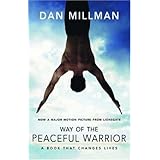These are books I've read which have furthered my perspective and which others may find valuable or, in some cases, just fun to read. Any book that bends my viewpoint, expands my comfort zone or simply makes me wonder about the status quo is worth every penny.
* * * * *
This is where it all started. Someone suggested I read this book nineteen years ago and, once I managed to shut my brain off from correcting the author's syntax, the book's ideas became much more interesting.
James Redfield lays out a prophecy of what the world will become and, though it is fiction, it has some intriguing ideas about the future of humanity.
* * * * *
Stephen Hawking explains life outside our planet in laymen's terms. Whether you agree or not with origins of space and time, it's a fascinating read.
* * * * *
"My heart is afraid that it will have to suffer," the boy told the alchemist one night as they looked up at the moonless sky." Tell your heart that the fear of suffering is worse than the suffering itself. And that no heart has ever suffered when it goes in search of its dreams."
Paul Coelho has created a book that changes lives. In this tale of a shepherd boy who gives up all he knows to follow his dream, Coelho spins a simple story of hope, enlightenment and resilience.
This is one of those books that only comes along once every decade... or few decades.
* * * * *
This is by far the best psychology book I have read, bar none. The book was published in 1961 and is as relevant today than it was then (or more-so).
Carl Rogers was a therapist and founder of the humanistic psychology movement, separating himself from "traditional" treatment like shock therapy. His therapy seldom included pharmacology. The rush for doctors to prescribe drugs such as Prozac as a time saving tool in recent decades has created an even greater need for this book.
Dr Roger's "client centred therapy" has never been more important and all of his claims come from personal experience, not a science lab.
* * * * *
What are thoughts made of?
Are we biologically addicted to certain emotions?
Can we become addicted to an emotion?
How can I create my everyday life?
What the Bleep do We Know? asks the big questions.
How do a group of scientists go about explaining quantum physics to anyone and everyone? Make a movie, then write a book that is easy and fun to read and the ideas are laid out to build upon each other. Then make the book relevant to everyone's life! The greatest difficulty in explaining quantum physics, of course, is that science has a hard time explaining it to themselves. But then, that's half the fun.
If you're not into reading, there is a movie version starring Marlee Matlin that I've viewed about... oh... a dozen times.
* * * * *

This was the next book I read after The Celestine Prophesy. While Prophecy was a fun romp into conjecture (and perhaps a harbinger of our future), Dan Millman's book is hell bent on showing us how to take control of our lives by living in the moment.
The Way of the Peaceful Warrior is part fiction, part reality as Millman carves his way through a life fraught with utter disappointment and his road back to victory. The lessons learned by Millman can be applied to any life.
This one is a movie as well and I liked the book better.
* * * * *
The Saint, The Surfer and The CEO is a fun romp once you get past the tragic beginning. As someone once said to me, "the best way to have a breakthrough is to have a breakdown first".
There are plenty of resources out there that will tell you many of the things in this book and isn't it better to have a little fun along the way?
Sharma delivers a decent story with some valuable tools for creating a happy life. Definitely worth the read.
* * * * *
More books to come.
No comments:
Post a Comment
Please leave comments here.